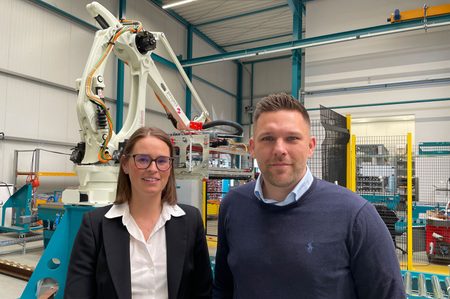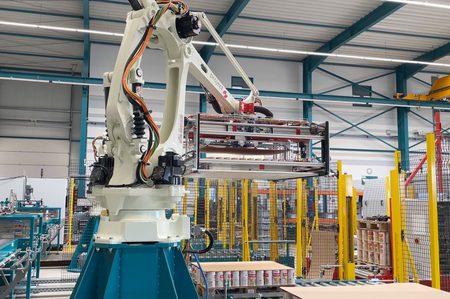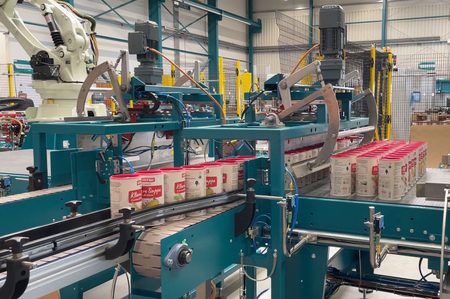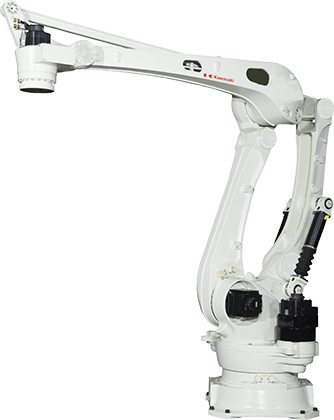
- IndustriesFood & Beverage
- ApplicationsPalletizing
- Robot SeriesCP series

The project group has specialized in the development of sophisticated automation solutions for packaging processes for many years. International customers from numerous industries such as food, beverages, hygiene, wood, steel and construction trust in the system integrator based in Kranenburg (Nordrhein-Westfalen) who delivers tailored solutions adapted to each client’s specific requirements — even when dealing with variable batch sizes or tight spatial constraints at production sites. This was also the case with a solution for Greinwald: the food manufacturer from the Allgäu region, known for its seasoning mixes, soups, sauces, and dressings. The collaboration originated through a recommendation from can manufacturer J.M. Schmitt — a long-standing customer of the project group and supplier to Greinwald.
Kawasaki Robotics CP180L at the heart of the automation system
Project manager Ella Liversage, who supports numerous customer projects across the board, is convinced by Kawasaki Robotics: “We know that Kawasaki is a pioneer in robotics. For us, the priority is working with a dependable partner that helps us minimize downtime and ensures reliable performance.” The solution implemented at Greinwald includes two identical robotic systems, each equipped with a high-speed Kawasaki CP180L palletizing robot—and each system integrates two pick-up and two feed stations.

With a maximum reach of 3,255 mm and a payload capacity of up to 180 kg, the CP180L serves as the powerful centerpiece of this compact and efficient automation setup. The cans, which are produced in variable sizes, are stacked in up to 15 layers with a maximum total height of 1,765 mm on an Euro pallet. Efficiency was crucial to the project right from the start: the target was up to 160 cans and 3 layers per robot per minute. During the palletizing process, empty pallets are drawn from a magazine via a conveyor system and placed onto one of four palletizing stations. Depending on the recipe selected, either a layer of product or an intermediate layer is added. The PROPAL gripper head, designed in-house by the project group, can approach all 4 pallet positions and all 4 layer tables.

Filled cans are conveyed from a staging table to the system using a row pusher and storage system, then organized into layers—either aligned or staggered as needed. Once a pallet is fully stacked, it’s moved out of the system via a transfer carriage to the wrapping station. After wrapping, the pallet is ready for removal. If labeling is required, the optional PROLABEL pallet labeling system, also developed by project group, applies the necessary identifiers.
Modular design creates flexibility
A key success factor of the solution is its modular design, which offers maximum flexibility. If required, the system can easily be extended by two palletizing stations and feeders. Interfaces to adjacent machines enable easy coordination and interlinking of all elements of production. Thanks to the modular design, a third robot can also be integrated in future with minimal effort in order to handle larger production volumes efficiently.

Ella Liversage draws a positive balance: “We are very satisfied with the service from Kawasaki. We have short response times for any inquiries. They are answered promptly, we always have friendly contacts and we’ve never felt left on our own.” Sascha Rosteck, project manager for automation at Greinwald, also agrees: “We were able to successfully implement the project together with Kawasaki. With the two CP180Ls, we were able to effectively meet the specifications of 320 cans and 6 layers per minute.”

